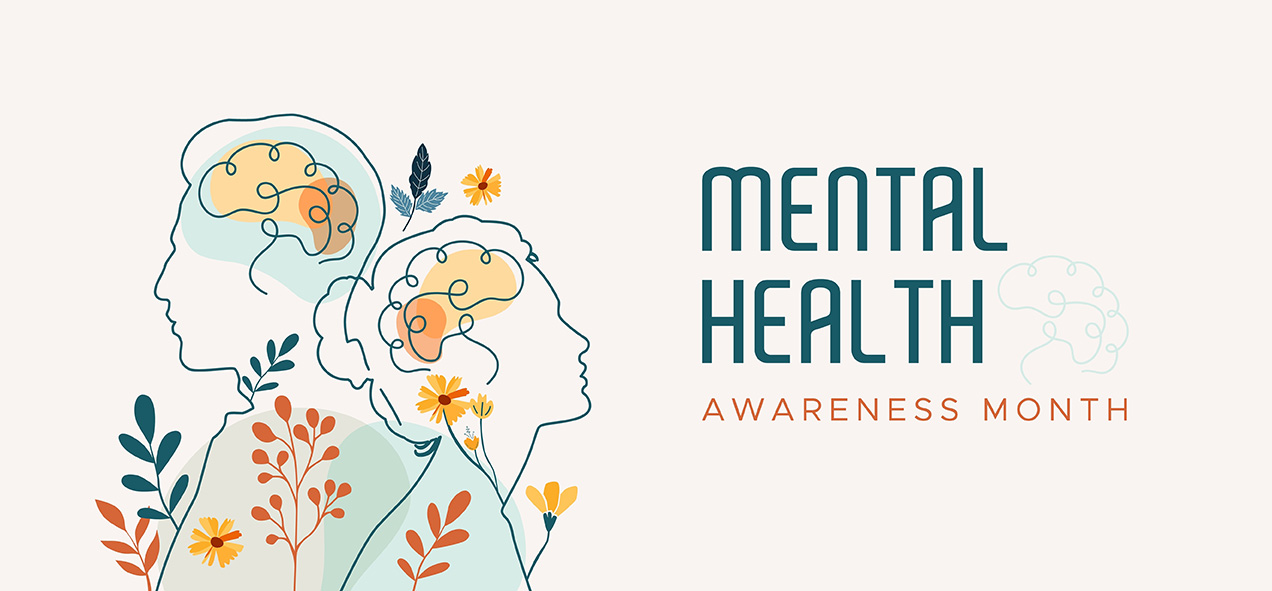Prioritizing Your Mental Wellness
May 12, 2025Categories: Health & Wellness, Mental Health, Garnet Health Doctors, Blog
Tags: Health & Wellness, Mental Health, Garnet Health Doctors, Blog
Prioritizing Your Mental Wellness During Mental Health Awareness Month and Beyond
 When we talk about “getting healthy,” it’s natural to assume the focus would be on our physical well-being: pledging to eat healthier foods and get more exercise—even making sure to get proper health screenings, like for breast and prostate cancer. But our mental wellness is just as important for living a full, balanced life.
When we talk about “getting healthy,” it’s natural to assume the focus would be on our physical well-being: pledging to eat healthier foods and get more exercise—even making sure to get proper health screenings, like for breast and prostate cancer. But our mental wellness is just as important for living a full, balanced life.
May is Mental Health Awareness Month, a time to elevate conversations about emotional and psychological well-being. Mental wellness extends far beyond the diagnosis or treatment of mental illness—it reflects how we think, feel, act and cope with daily life.
No one is immune to the stress and challenges of daily life. But the habits we develop now can help us become more resilient when we do face adversity. Everyone can benefit from prioritizing mental wellness. When we take time to focus on ourselves, we improve our connections with family, friends, coworkers and community members.
Here are five ways to promote mental wellness:
1. Practice Regular Self Check-ins
Make it a habit to pause and ask yourself, “How am I doing?” By identifying and naming your emotions, you build insight and resilience. It’s important to embrace your feelings without shame or judgment. Developing self-awareness to recognize, label and manage emotions is a skill we can all learn and benefit from.
2. Build and Maintain Social Connections
Humans are wired for connection. Prioritize friendships and community—whether through regular coffee dates, family dinners or community groups. Meaningful relationships enhance well-being, reduce loneliness, and help us feel seen and supported. Equally important is having the courage to recognize unhealthy relationships and the strength to release them for your own well-being.
3. Explore Personal Hobbies and Interests
Work can be fulfilling, but reclaiming your time for non-work-related activities is vital. Engaging in hobbies and creative pursuits is more than just enjoyable—it can reduce anxiety, boost mood and spark new joy. Visit your local library, sign up for a pottery class, join a book club or explore gardening. These simple acts can help you rediscover personal fulfillment outside of daily obligations.
4. Develop Personalized Coping Strategies
Stress is a part of life, but how we respond to it can make all the difference. Establish your own go-to toolkit for managing stress. Some effective strategies include:
- Accepting what’s beyond your control
- Reframing your perspective
- Problem-solving what you can change
- Talking to a trusted friend or mentor
- Practicing positive self-talk and giving yourself grace
- Scheduling “worry time” to contain anxious thoughts
- Letting go, relaxing and being kind to yourself
Choose two or three strategies that feel right for you and practice them consistently until they become second nature.
5. Improve Your Physical Health
The mind-body connection is real. Good physical health can directly impact mental wellness. Incorporate habits like:
- Getting adequate, restful sleep
- Eating balanced, nourishing meals
- Staying physically active throughout the week
- Attending regular health check-ups
When your body is healthy, it becomes easier to manage emotions, focus and stay resilient.
Supporting Mental Wellness Across Life Stages
Each stage of life brings new emotional terrain. Transition periods—like becoming a parent, retiring, grieving a loved one or adapting to a health diagnosis—can challenge even the most grounded among us. These vulnerable times call for extra self-care, patience and the support of others.
Nurturing the Mental Health of Young People
One of the most critical and often overlooked populations in mental wellness discussions is young people. Adolescents and young adults are in a sensitive period of emotional development, facing pressure from school, social media, family expectations and peer influence. Their ability to form a healthy self-identity depends greatly on the emotional environment around them.
Here’s how we can actively support youth mental wellness:
- Provide Safe Spaces to Talk: Encourage open conversations without judgment. Create environments—at home, at school and in the community—where young people feel safe sharing how they feel.
- Encourage Offline Activities: Real-life experiences such as sports, arts, reading or volunteering can help reduce screen time and foster confidence, teamwork and self-expression.
- Be a Trusted Adult: Sometimes, all it takes is one caring adult—a parent, mentor, coach or neighbor showing up with empathy and consistency—to make a difference. You don’t need to have the answers. Your presence alone is powerful.
- Foster Positive Self-Esteem: Help the young people in your life by rejoicing in their strengths, talents and individuality. Remind them that they’re enough just as they are, and there’s no benefit or good to come from negative self-talk and comparing themselves with others.
- Recognize Warning Signs: Be attentive to sudden changes in mood, behavior or academic performance. Early support and professional guidance can prevent deeper issues from developing.
If you are having difficulty managing your mental and emotional health, seek services that can support you through the process. For immediate 24/7 crisis support in Sullivan County, dial 988 or go to your nearest emergency room. For counseling services, call Garnet Health Doctors in Harris at (845) 333-8909 to make an appointment.
This Mental Health Awareness Month, commit to checking in on yourself, supporting someone else and advocating for emotional well-being at every stage of life. Mental wellness is not just an individual responsibility—it’s a shared one.
To learn more, visit garnethealth.org/services/behavioral-health.